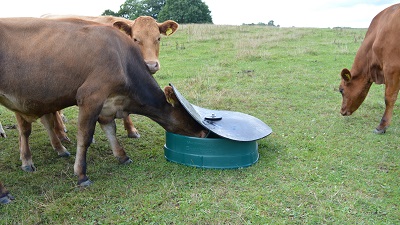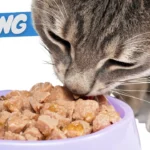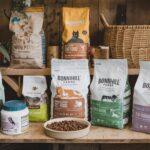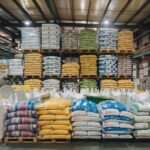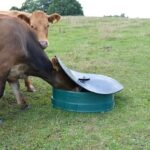Introduction: Why Cow Mineral Feeders Are Vital for Cattle Nutrition
Maintaining optimal health and productivity in cattle requires more than just regular feed. One crucial aspect of cattle nutrition is the proper intake of essential minerals. A cow mineral feeder plays a significant role in ensuring that cows receive the right balance of vitamins and minerals, which are necessary for growth, milk production, and overall well-being.
In this guide, we’ll explore the importance of mineral supplementation for cows, how cow mineral feeders work, the different types available, and how to choose the best one for your herd. Whether you’re a small-scale farmer or managing a large cattle operation, understanding the role of mineral feeders is key to ensuring your cows thrive.
What is a Cow Mineral Feeder?
A cow mineral feeder is a specially designed apparatus used to provide cows with essential minerals in a controlled and efficient manner. These feeders are often filled with mineral supplements that are either free-choice or rationed to cattle. The goal is to ensure cows have access to the nutrients they need for optimal health and productivity, especially in environments where natural forage may not meet all their nutritional requirements.
Key benefits of using cow mineral feeders include:
- Prevention of mineral deficiencies: Ensuring cows receive adequate minerals like calcium, phosphorus, magnesium, and salt, which are essential for bone health, reproduction, and milk production.
- Enhanced productivity: Cows with proper mineral intake tend to produce more milk, have better fertility rates, and experience faster growth.
- Cost-effective supplementation: By controlling mineral intake, farmers can reduce waste and ensure that cows are not over-consuming expensive supplements.
Why Are Minerals So Important for Cattle Health?
Minerals are vital for cows for several reasons. Without adequate mineral intake, cattle can face numerous health issues, including reduced fertility, weak bones, low milk production, and poor immune function. Here’s a closer look at why minerals are so important for cattle:
- Calcium: Essential for strong bones and proper muscle function, particularly during lactation and calving.
- Phosphorus: Works with calcium to support bone health and is critical for energy metabolism and growth.
- Magnesium: Helps regulate muscle function and supports proper nerve activity. Deficiency can lead to conditions like grass tetany.
- Salt: Aids in water retention, and electrolyte balance, and supports overall metabolism.
Without access to adequate mineral sources, cows are prone to nutritional deficiencies that can result in poor health and reduced productivity. Cow mineral feeders help prevent these deficiencies by ensuring a consistent and controlled intake of these vital nutrients.
Types of Cow Mineral Feeders
There are several types of cow mineral feeders available, each suited to different needs and environments. Some of the most common types include:
1. Trough-style Mineral Feeders
Trough-style feeders are simple, open containers where minerals are placed for cows to access freely. These feeders are typically used in smaller herds or in situations where cows are in close proximity to the feeding area. While they provide easy access to minerals, they can result in mineral waste if not managed properly.
2. Block Mineral Feeders
Block mineral feeders are designed to hold solid mineral blocks that cows lick for their nutrient intake. These blocks are highly durable and less prone to spillage, making them ideal for larger herds or grazing areas where cows may not always have access to a centralized feeding area.
3. Automatic Mineral Feeders
For larger operations, automatic mineral feeders offer a more sophisticated option. These feeders are often used in large barns or pastures and automatically dispense minerals in controlled amounts. Automatic feeders are efficient, reduce waste, and can be programmed to deliver the right quantity based on the cows’ needs.
4. Suspended Mineral Feeders
Suspended mineral feeders are often used in more rugged terrains or for free-range cattle. These feeders are elevated off the ground, which helps reduce contamination from dirt and manure. Suspended feeders are typically easy to install and maintain.
Choosing the Right Cow Mineral Feeder
Selecting the right cow mineral feeder depends on several factors, including herd size, grazing habits, and the mineral needs of your cows. Here are a few things to consider when choosing a mineral feeder for your cattle:
- Herd Size: For larger herds, automatic or block feeders might be more efficient, while smaller herds can benefit from simple trough-style feeders.
- Environment: Consider the weather conditions and terrain. For instance, suspended mineral feeders are ideal for areas with high moisture or dust.
- Mineral Type: Determine whether you need a general mineral supplement or specific nutrients like calcium or magnesium. This can influence the type of feeder you choose.
- Waste Management: Choose a feeder that minimizes mineral waste and spillage. Block feeders and automatic feeders tend to be more efficient in this regard.
How Often Should You Replace Minerals in a Cow Feeder?
The frequency of replacing minerals in a cow mineral feeder depends on the type of feeder and the mineral requirements of your cows. For block feeders, the blocks can last for weeks or even months, depending on the size of the herd and the rate at which cows consume the blocks.
For trough-style feeders, minerals should be replenished more frequently, as cows tend to consume them faster. Regularly check the feeder to ensure there’s enough supply, and avoid contamination by rain or dirt.
Frequently Asked Questions (FAQ) About Cow Mineral Feeders
1. Can cows get too much mineral from a mineral feeder?
Yes, it is possible for cows to consume too many minerals, especially if the mineral feeder is not calibrated correctly. Over-supplementation can lead to toxicity, affecting the cow’s health and production. It’s important to follow the recommended dosage and adjust based on the herd’s specific needs.
2. How do I know if my cows are getting the right amount of minerals?
Monitoring your cows’ health and productivity can provide clues. Signs of mineral deficiencies include poor growth, weak bones, low milk production, and fertility issues. Regular testing of soil and forage can also help you assess whether additional supplementation is necessary.
3. Can I make my own mineral feeder at home?
While it’s possible to create a DIY mineral feeder using basic materials, it’s generally recommended to invest in a professionally designed feeder for durability, efficiency, and ease of use. This ensures your cows receive the appropriate amount of minerals without waste.
Conclusion: Ensuring the Health of Your Herd with the Right Cow Mineral Feeder
Providing proper mineral supplementation is one of the best ways to promote the health and productivity of your cows. By investing in a high-quality cow mineral feeder, you can ensure that your cattle receive the essential nutrients they need to thrive. Whether you opt for a simple trough feeder or an advanced automatic dispenser, the right feeder can make a significant difference in your herd’s overall well-being.
